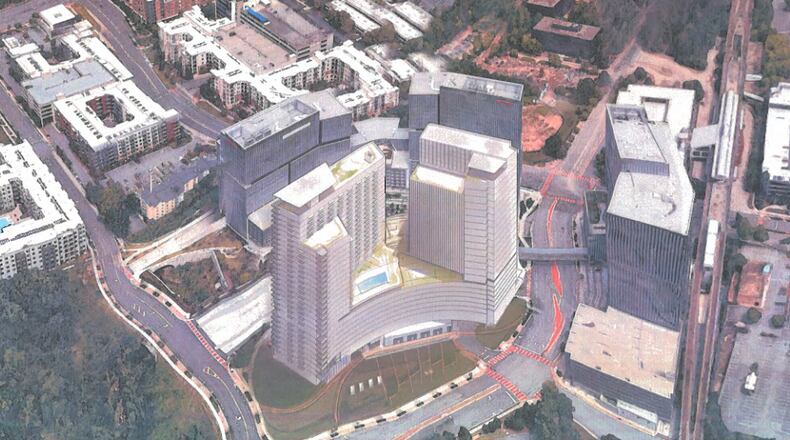The developer behind a massive corporate campus in Dunwoody is looking to incorporate a hotel and hundreds of apartments due to decreased demand for new office towers.
Texas-based KDC plans to add 175 hotel rooms and 300 apartments to its Park Center development, a large office district anchored by insurance giant State Farm. The last undeveloped portion of the campus was initially pitched as a fourth office tower, but KDC representatives told Dunwoody leaders plans for a standalone office tower are no longer viable and instead are proposing a mix of uses.
David Kirk, an attorney representing KDC, told the Dunwoody Planning Commission last week that incorporating residential aspects into the office district “reflects the fundamental changes in the world and in real estate over the last several years.” The planning commission unanimously endorsed KDC’s new plan that requires the site’s rezoning, which will later go before the Dunwoody City Council for a final vote.
Instead of a single tower, KDC now plans to build two, including one that features a hotel and office space.
Demand for office space has waned since the onset of COVID-19, which prompted scores of white collar employees to work from home. In the years since, office vacancy across metro Atlanta has skyrocketed, with the region setting records for its abundance of empty and unwanted office square footage.
Announced in 2014, KDC partnered with State Farm to develop the Park Center campus next to the Dunwoody MARTA station between Hammond Drive and the Perimeter. Three towers have opened, totaling more than 1.6 million square feet of offices. A fourth building at 245 Perimeter Center Parkway was slated to add another 700,000 square feet of offices to the campus.
A report by Dunwoody staff agreed with KDC that another office-focused tower “is not feasible,” instead finding that residential development would better suit the campus, especially because of its proximity to the MARTA station.
Park Center has also faced tenant issues as a result of the pandemic. State Farm, which enacted a hybrid work policy, agreed to sublease the entire 570,000-square-foot Park Center 1 tower to Carvana. However, the online used car seller backed out of that deal last spring. A State Farm spokesperson said the company remains committed to its long-term leases at the three existing Park Center buildings.
“We are confident we have the space we need on the campus to meet our employee facility needs,” the spokesperson said. “... State Farm continually evaluates its operations to ensure it has the right people in the right places to serve our customers’ changing needs.”
The new proposal calls for 300,000 square feet of office — less than half of the original plan — and 22,000 square feet of retail and restaurant space along with 175 hotel rooms and 300 apartments. The site would be divided into two towers, a 20-story apartment building and an 18-story office and hotel building. Offices would comprise the lower 12 floors, while six hotel floors would top the tower.
Jim George, development program manager at KDC, said his firm will bring in development partners to handle the residential and hotel aspects. He said the apartments will be high-end without any units reserved at below market-rent rates.
City staff said overall traffic trips will increase due to the added density, but those trips will be less concentrated during peak travel times due to the reduction in office space. No residents spoke during public comment Feb. 13.
About the Author
Keep Reading
The Latest
Featured




